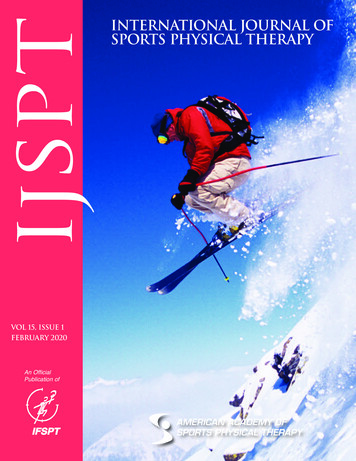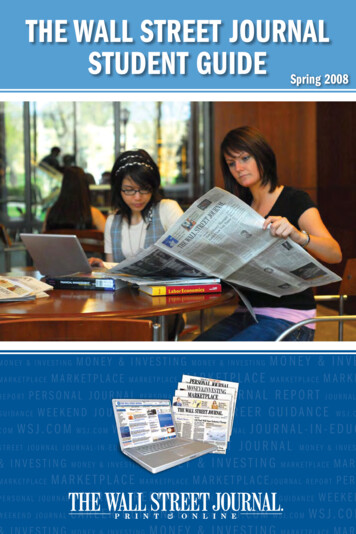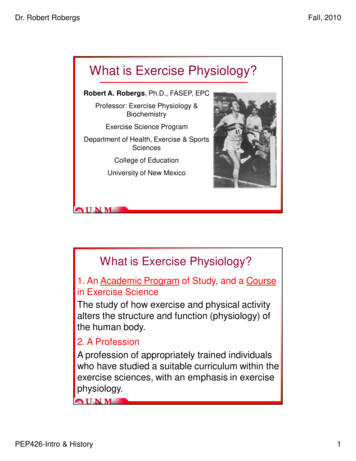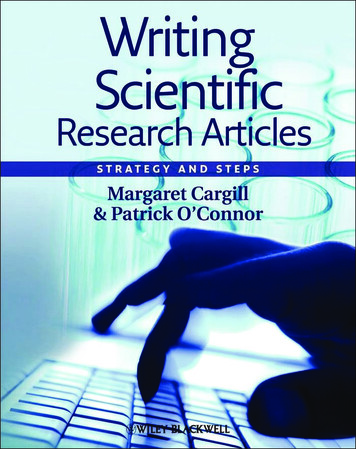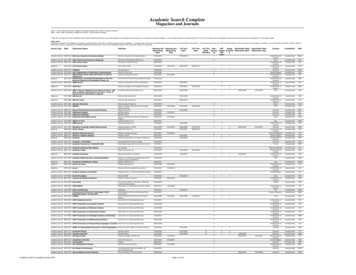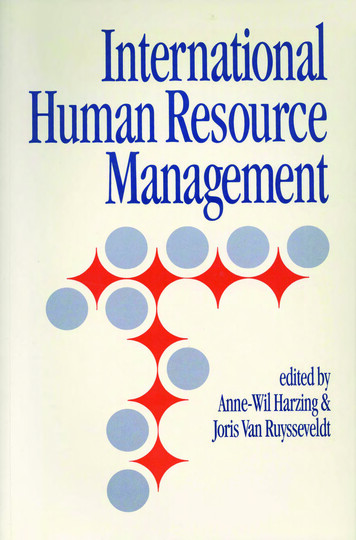
Transcription
An International Journal for Students ofTheological and Religious StudiesVolume 45 Issue 2 August 2020EDITORIAL: Pursuing Scholarship in a Pandemic:Reflections on Lewis’s “Learning in War-Time”Brian J. Tabb227STRANGE TIMES: Praise and Polemic in OurGlobal PandemicDaniel Strange233The Use of Leviticus 18:5 in Galatians 3:12: ARedemptive-Historical ReassessmentJason S. DeRouchie240Celebration and Betrayal: Martin Luther King’sCase for Racial Justice and Our Current DilemmaJames S. Spiegel260Christ and the Concept of PersonLydia Jaeger277The “Epistle of Straw”: Reflections on Luther andthe Epistle of JamesMartin Foord291Interpreting Faith in the Reformation: Catholicand Protestant Interpretations of Habakkuk2:4b and Its New Testament QuotationsMario M.C. Melendez299The Resurgence of Two Kingdoms Doctrine: ASurvey of the LiteratureMichael N. Jacobs314Why Not Grandchildren? An Argument againstReformed PaedobaptismGavin Ortlund333Is “Online Church” Really Church? The Churchas God’s TempleRonald L. Giese, Jr.347PASTORAL PENSÉES: Text-Criticism and thePulpit: Should One Preach about the WomanCaught in Adultery?Timothy E. Miller368Book Reviews385
DESCRIPTIONThemelios is an international, evangelical, peer-reviewed theological journal that expounds and defends the historicChristian faith. Its primary audience is theological students and pastors, though scholars read it as well. Themeliosbegan in 1975 and was operated by RTSF/UCCF in the UK, and it became a digital journal operated by The GospelCoalition in 2008. The editorial team draws participants from across the globe as editors, essayists, and reviewers.Themelios is published three times a year online at The Gospel Coalition website in PDF and HTML, and may bepurchased in digital format with Logos Bible Software and in print with Wipf and Stock. Themelios is copyrighted byThe Gospel Coalition. Readers are free to use it and circulate it in digital form without further permission, but theymust acknowledge the source and may not change the content.EDITORSBOOK REVIEW EDITORSGeneral Editor: Brian TabbBethlehem College & Seminary720 13th Avenue SouthMinneapolis, MN 55415, USAbrian.tabb@thegospelcoalition.orgOld TestamentPeter LauOMF International18-20 Oxford StEpping, NSW 1710, c TheologyDavid GarnerWestminster Theological Seminary2960 Church RoadGlenside, PA 19038, USAdavid.garner@thegospelcoalition.orgNew TestamentDavid StarlingMorling College120 Herring RoadMacquarie Park, NSW 2113, cs and PastoraliaRob SmithSydney Missionary & Bible College43 Badminton RoadCroydon, NSW 2132, Australiarob.smith@thegospelcoalition.orgHistory and Historical TheologyGeoff ChangMidwestern Baptist TheologicalSeminary5001 N Oak TrafficwayKansas City, MO 64118geoff.chang@thegospelcoalition.orgMission and CultureJackson WuMission ONEPO Box 5960Scottsdale, AZ 85261, USAjackson.wu@thegospelcoalition.orgContributing Editor: D. A. CarsonTrinity Evangelical Divinity School2065 Half Day RoadDeerfield, IL 60015, USAthemelios@thegospelcoalition.orgContributing Editor: Daniel StrangeOak Hill Theological CollegeChase Side, SouthgateLondon, N14 4PS, UKdaniels@oakhill.ac.ukAdministrator: Andy NaselliBethlehem College & Seminary720 13th Avenue SouthMinneapolis, MN 55415, USAthemelios@thegospelcoalition.orgEDITORIAL BOARDGerald Bray, Beeson Divinity School; Hassell Bullock, Wheaton College; Benjamin Gladd, Reformed TheologicalSeminary; Paul Helseth, University of Northwestern, St. Paul; Paul House, Beeson Divinity School; Hans Madueme,Covenant College; Ken Magnuson, The Evangelical Theological Society; Gavin Ortlund, First Baptist Church,Ojai; Ken Stewart, Covenant College; Mark D. Thompson, Moore Theological College; Paul Williamson, MooreTheological College; Mary Willson, Second Presbyterian Church; Stephen Witmer, Pepperell Christian Fellowship;Robert Yarbrough, Covenant Seminary.ARTICLESThemelios typically publishes articles that are 4,000 to 9,000 words (including footnotes). Prospective contributorsshould submit articles by email to the managing editor in Microsoft Word (.doc or .docx) or Rich Text Format (.rtf ).Submissions should not include the author’s name or institutional affiliation for blind peer-review. Articles shoulduse clear, concise English and should consistently adopt either UK or USA spelling and punctuation conventions.Special characters (such as Greek and Hebrew) require a Unicode font. Abbreviations and bibliographic referencesshould conform to The SBL Handbook of Style (2nd ed.), supplemented by The Chicago Manual of Style (16th ed.).For examples of the the journal's style, consult the most recent Themelios issues and the contributor guidelines.REVIEWSThe book review editors generally select individuals for book reviews, but potential reviewers may contact themabout reviewing specific books. As part of arranging book reviews, the book review editors will supply bookreview guidelines to reviewers.
Themelios 45.2 (2020): 227–32EDITORIALPursuing Scholarship in a Pandemic:Reflections on Lewis’s “Learning in WarTime”— Brian J. Tabb —Brian Tabb is academic dean and associate professor of biblical studies atBethlehem College & Seminary in Minneapolis, an elder of Bethlehem BaptistChurch, and general editor of Themelios.The first time I wore a facemask and plastic gloves to our local grocery story, I was struck by thereality that things were not “normal.” In January 2020, the world first learned about a “novelcoronavirus” outbreak that infected thousands of people in China. But by March, this farawayepidemic had become a worldwide pandemic that had infected millions and killed thousands, causeddramatic upheavals in the global economy, and fundamentally disrupted business-as-usual for mostsocieties.1 Church buildings were closed on Easter Sunday. Schools at all levels from preschool to postgraduate studies were forced to adopt online and distance learning options and to hold “virtual” commencement services for graduates. Many universities and seminaries also eliminated faculty positionsand degree programs due to declining enrollments, significant budget shortfalls, and uncertain futures.2Even as “stay-at-home” orders lifted and businesses and churches began to reopen, an article in TheAtlantic offered the sober assessment: “There’s no going back to ‘normal.’”3An eighty-year-old sermon by C. S. Lewis offers timely perspective for these abnormal times. T. R.Milford, the vicar of St. Mary’s in Oxford, turned to Lewis—a veteran of the Great War and well-knownChristian lecturer at Magdalen College—to address the concerns of Oxford undergraduates at thebeginning of World War II. So, on October 22, 1939, Lewis addressed a large, attentive crowd of Oxfordstudents and faculty with the sermon “‘None Other Gods’: Culture in War-Time.” The address wasinitially published as a pamphlet entitled “The Christian in Danger” and later appeared in a collectionof Lewis’s occasional messages as “Learning in War-Time.”41See further Brian J. Tabb, “Theological Reflections on the Pandemic,” Themelios 45 (2020): 1–7.For example, Liberty University laid off philosophy professors and cut its philosophy program. “EnrollmentTrends a Factor in Ending Philosophy Degree Program,” Liberty University, 12 May 2020, https://tinyurl.com/yd2kb729.2Uri Friedman, “I Have Seen the Future—And It’s Not the Life We Knew,” The Atlantic, 1 May 2020, https://tinyurl.com/ydbhpda7.3Walter Hooper, “Introduction,” in C. S. Lewis, The Weight of Glory and Other Addresses (1949; reprint, NewYork: HarperCollins, 2001), 17–18.4227
ThemeliosLewis reminds us that “life has never been normal.”5 He explains why and how we should pursueserious learning for the glory of God—whether in war or peace-time—and highlights three acutechallenges that distract or discourage such scholarship. This article seeks to glean wisdom from Lewis’s“war-time” address to inform and encourage pastors, theological students, and other readers who laborduring what the apostle would call “the present distress” (1 Cor 7:26).1. The Need for Serious LearningWhy would any sane person undertake serious study in theology, humanities, or the arts in themiddle of a world war or a global pandemic? Such pursuits may seem futile and misguided: an unwiseinvestment of resources and time given the uncertain job market. Some pundits might even proclaimit socially irresponsible to have one’s head in the books when the lives of millions of people hang in thebalance. We might be tempted to think that engaging in patient, careful scholarship at such times isanalogous to “fiddling while Rome burns” (p. 47). Lewis addresses these sorts of objections to traditionaluniversity studies due to the uncertainties and urgencies of World War II by arguing that we mustattempt to “see the present calamity in a true perspective” (p. 49). A war—or a pandemic—does notreally create a “new situation”; rather, it forces us to recognize “the permanent human situation” thatpeople have always “lived on the edge of a precipice” (p. 49). “Normal life” is a myth; if people waitfor optimal conditions before searching out knowledge of what is true, good, and beautiful, they willnever begin. Lewis reminds us that past generations had their share of crises and challenges, yet humanbeings chose to pursue knowledge and cultural activities anyway. It’s not possible to suspend our “wholeintellectual and aesthetic activity” during a crisis (p. 52). We will go on reading even in war-time—thequestion is whether we will read good books that challenge us to think deeply and clearly or whether wewill spend our time on shallow, banal distractions.Lewis argues that we should not sharply distinguish between our “natural” and “spiritual” humanactivities since “every duty is a religious duy” (pp. 53–55). Whether someone is a composer or cleaner,a classicist or carpenter, their natural work becomes spiritual when they offer it humbly “as to the Lord”(pp. 55–56). Thus, intellectual pursuits of knowledge and beauty even in war-time can and do glorifyGod, though Lewis warns against making scholarly success into an idol if we “delight not in the exerciseof our talents but in the fact that they are ours, or even in the reputation they bring us” (p. 57).What vocations are “essential” in a modern society? During the COVID-19 pandemic, most federal,state, and local governments temporarily closed many sectors of society while allowing only “essential”workers to remain on the job. The work of philosophers, historians, and theologians (for example) mayseem expendable, while the work of emergency doctors and vaccine researchers is deemed critical in asociety pummeled by a deadly disease. However, such an assessment is short-sighted if we consider thelong-term flourishing of human society.Philosophy concerns the pursuit of wisdom.6 Students of philosophy learn to make sound arguments,reflect deeply on what is true, good, and beautiful, and consider how we should live in a complex world.A society with little regard for truth, logic, aesthetics, or morals would be “a brave new world” indeed!Lewis calls on Christian scholars to serve the church by working harder and thinking more deeply toC. S. Lewis, “Learning in War-Time,” in The Weight of Glory and Other Addresses (1949; reprint, New York:HarperCollins, 1949), 49. Hereafter I cite Lewis’s address with parenthetical page references.56Aristotle, Nichomachean Ethics 1177a.228
Editorial: Pursuing Scholarship in a Pandemicpromote “good philosophy” that offers true answers and reasonable defenses against the philosophicalfads and fashions of the age (p. 58).Similarly, we need to study the past to rightly evaluate the challenges and concerns of the present.As the Preacher reminds us, “What has been is what will be, and what has been done is what will bedone, and there is nothing new under the sun” (Eccl 1:9). Words like “unprecedented” have often beenused for the coronavirus pandemic, yet ours is hardly the first generation to face the threat of deadlydisease. Good history allows us to “relativize ourselves and our times,” leading to greater understandingof our world and our place in it.7 By analyzing past times and peoples, Lewis suggests that the seriousstudent of history builds up intellectual antibodies that offer some immunity “from the great cataract ofnonsense that pours from the press and the microphone of his own age” (p. 59).Lewis does not directly address the nature and need for serious theological study in “Learning inWar-Time,” but elsewhere he reasons that “any man who wants to think about God at all would like tohave the clearest and most accurate ideas about Him which are available.”8 He insists that theology ispractical, particularly in war-time, as everyone has their own ideas about God (many of them wrong)and is susceptible to various theological novelties “which real Theologians tried centuries ago andrejected.”9 While the coronavirus pandemic has disrupted the global economy, claimed hundreds ofthousands of lives, and radically altered “normal” life for most people, it has also forced many to wrestlewith their own mortality and ultimate questions. Lewis reasons, “War makes death real to us. Wesee unmistakably the sort of universe in which we have all along been living, and must come to termswith it” (pp. 62–63). Applying Lewis’s words to our present crisis, we realize that there is a critical needand urgent opportunity for serious biblical and theological scholarship that expounds “the bed-rockfoundation of the historic faith” in humble service to Christ and his church.10 Wars and pandemicsremind people that something is deeply wrong in our world. Christian theology informs that intuition byrevealing that armed conflicts and rogue viruses are symptoms of the deepest problem in the universe:humans have rebelled against the Creator God, who will judge everyone according to their works. Thus,the true solution to our ills runs not through the White House or the W.H.O. but through Calvary,where the Son of God suffered and died for sinners and then disarmed death by conquering the grave.A search of the library archives reveals that many students did indeed go on “learning in war-time”at Oxford and other universities.11 The noted scholar of the early church, W. H. C. Frend, completedhis DPhil thesis on North African Christianity at Oxford in 1940. George B. Caird finished his Oxforddoctorate in 1944, writing on the New Testament concept of glory, and went on to serve as the university’sDean Ireland’s Professor of the Exegesis of Holy Scripture. To these examples we could add war-timeOxford theses on Bacon’s use of Scripture (1940), post-biblical Hebrew syntax (1943), Bucer and theEnglish Reformation (1943), the worship of the English Puritans (1944), Barth’s conception of grace(1945), Augustine’s work Against the Academics (1945), and dozens more. This historical perspective7Carl R. Truemann, Histories and Fallacies: Problems Faced in the Writing of History (Wheaton, IL: Crossway, 2010), 174.8C. S. Lewis, Mere Christianity (New York: Macmillan, 1952), 153.9Lewis, Mere Christianity, 155.Brian J. Tabb, “Themelios Then and Now: The Journal’s Name, History, and Contribution,” Themelios 44(2019): 4.1011do.The examples in this paragraph come from the British Library’s EThOS catalog, https://ethos.bl.uk/Home.229
Themeliosshould offer encouragement to contemporary seminarians and graduate students committed to learningin pandemic-time despite financial pressures, library closures, and uncertain employment prospects.2. Three Enemies of Serious LearningLewis identifies three “enemies” that rise up against scholars in times such as war: excitement,frustration, and fear.2.1. ExcitementThe first such enemy is excitement, by which Lewis means “the tendency to think and feel aboutthe war when we had intended to think about our work” (pp. 59–60). That is, scholars can becomedistracted by a current crisis and fail to invest their full energy in their scholarly pursuits. Today, dangerof “excitement” takes the form of preoccupation with social media, constantly scrolling Twitter andsearching Google to follow the latest news and analysis about the number of confirmed coronaviruscases, the perilous economic situation, and the state of political turmoil in Washington, London, orJohannesburg. This is not an obvious enemy to scholarship; it feels natural to stay up-to-date on currentevents, and who wants to appear uninformed when people are losing their jobs and suffering from alethal virus? Such “excitement” or distraction hinders us from pursuing what Cal Newport calls “deepwork”—activities in which we focus our full concentration and push our cognitive capacities to theirlimits.12 Distraction-free work hones our abilities and harnesses our energy to creates something of trueand lasting value. It’s much easier to write tweets and scan headlines than it is to analyze Hebrew syntax,develop philosophical proofs, or read dense Puritan prose.Lewis reminds us that “there are always plenty of rivals to our work” (p. 60). COVID-19 did notcreate the enemy of “excitement” but only aggravates our preexisting condition. Long before the recentcoronavirus outbreak, people spent far too much time consuming social media on their smart phonesand watching CNN “breaking news.” Tony Reinke writes, “The human appetite for distraction is high inevery age, because distractions give us easy escape from the silence and solitude whereby we becomeacquainted with our finitude, our inescapable mortality, and the distance of God from all our desires,hopes, and pleasures.”13 We crave what seems immediate, exciting, and relevant, and we are often all toowilling to break from our deep work that feels tedious or mundane to make sure that we do not missout on a friend’s status update or the latest headlines about today’s troubles. Lewis cautions, “If we letourselves, we shall always be waiting for some distraction or other to end before we can really get downto our work” (p. 60). There’s never really an optimal time to learn an ancient language or to write amonograph or a thesis. We must pursue knowledge and the work of scholarship even when conditionsseem unsuitable, because “favourable conditions never come” (p. 60). We may imitate the awarenessand resolve of the men of Issachar, “who had understanding of the times, to know what Israel ought todo” (1 Chr 12:32). For a proper perspective on our present circumstances, “we need intimate knowledgeCal Newport, Deep Work: Rules for Focused Success in a Distracted World (New York: Grand Central Publishing, 2016), 3.1213Tony Reinke, 12 Ways Your Phone Is Changing You (Wheaton, IL: Crossway, 2017), 44–45.230
Editorial: Pursuing Scholarship in a Pandemicof the past” (p. 58). Thus, the pastor unsure how to lead his church amid a pandemic may learn fromhow Christians responded to epidemics and pandemics in previous generations.142.2. FrustrationFrustration or anxiety is the second foe that scholars must face—“the feeling that we shall nothave time to finish” (p. 60). The Oxford undergraduates and others who gathered to hear Lewis’s 1939address had family and friends on the front lines of the war. They worried about German air raids andexperienced the challenges of war-time blackouts and paper shortages.15 Lewis reasons, “If our parentshave sent us to Oxford, if our country allows us to remain there, this is prima facie evidence that the lifewhich we, at any rate, can best lead to the glory of God at present is the learned life” (p. 56).Scholars will never finish every book and article that they aspire to write; pastors will likely retireor die before completing the sermon series that they have planned. Virgil—the greatest Roman poet—died in 19 BC before finishing his epic work, The Aeneid.16 Likewise, Jane Austen, Charles Dickens,Franz Kafka, Mark Twain, and countless other writers left behind unfinished novels. One also thinksof “America’s theologian” Jonathan Edwards, who died before completing his great magnum opus,A History of the Work of Redemption.17 And the great biblical scholar J. B. Lightfoot left unpublishedcommentaries and detailed exegetical notes on John’s Gospel, Acts, 2 Corinthians, and 1 Peter that werediscovered and published over a century after his death.18Lewis reminds us, “Happy work is best done by the man who takes his long-term plans somewhatlightly and works from moment to moment ‘as to the Lord.’ The present is the only time in which anyduty can be done or any grace received” (p. 61). Thus, we should not respond to the foe of “frustration”with inaction like the foolish servant who hid his master’s money in the ground rather than investingit (Matt 25:18, 24–27). At the same time, we must guard against the proud presumption that James4:13–16 warns about by recognizing that whenever we enroll in a degree program, plan a sermon series,or sign a book contract, we must humbly acknowledge, “If the Lord wills, we will live and do this or that”(Jas 4:15).2.3. FearFear is the third enemy that confronts those who would learn in war-time. “War threatens us withdeath and pain,” yet Lewis urges us to remember, “100 percent of us die, and the percentage cannotbe increased” (p. 61). War—or a coronavirus—may impact the cause or timing of death, but it does14See, for example, Rodney Stark, The Triumph of Christianity: How the Jesus Movement Became the World’sLargest Religion (New York: HarperOne, 2011), 114–19; Geoff Chang, “5 Lessons from Spurgeon’s Ministry in aCholera Outbreak,” The Gospel Coalition, 17 March 2020, https://tinyurl.com/y7scygfh; Jonathan Leeman andMichael Haykin, “Pastoring in a Pandemic, Episode 10: How Christians throughout the Ages Have Responded toPlagues and Pandemic,” 9Marks, 15 May 2020, https://tinyurl.com/yccujywm.15Alister E. McGrath, C. S. Lewis, A Life: Eccentric Genius, Reluctant Prophet (Carol Stream, IL: TyndaleHouse, 2013), 191–92.16F. J. Miller, “Evidences of Incompleteness in the ‘Aeneid’ of Vergil,” The Classical Journal 4 (1909).17George M. Marsden, Jonathan Edwards: A Life (New Haven: Yale University Press, 2003), 193–94.Ben Witherington III explains the circumstances of this discovery in his introduction to J. B. Lightfoot, TheActs of the Apostles: A Newly Discovered Commentary, ed. Ben Witherington III and Todd D. Still, The LightfootLegacy Set 1 (Downers Grove, IL: InterVarsity Press, 2014), 21–25.18231
Themeliosnot change its certainty. In fact, a perilous crisis such as a world war or a global pandemic forces us to“remember” death and “be always aware of our mortality” (p. 62). The World Health Organization beganpublishing daily situation reports about the coronavirus on 21 January 2020, when there were only282 confirmed cases; four months later, the global count exceeds 6 million cases and 375,000 reporteddeaths.19 These swelling numbers are shocking and sobering, yet they also remind us of what has beentrue all along: we are mortal and will all die. This realization that we “are not here to live forever” in factmoves us to live more fully today for others and for God.20 As creatures living in uncertain and abnormaltimes—because times are never certain or normal—Lewis challenges us to humbly offer to God ourpursuit of learning as “one of the appointed approaches to the Divine reality and the Divine beautywhich we hope to enjoy hereafter” (p. 63).Moses powerfully confronts us with our own mortality and offers us needed wisdom in Psalm2190. We must reckon with our creaturely limits—“the years of our life are seventy, or even by reasonof strength eighty”—and say to our Maker, “From everlasting to everlasting you are God” (vv. 2, 10).Whether we face armed conflict, coronavirus, or some other toil and trouble in this life, we pray, “Soteach us to number our days that we may get a heart of wisdom” (v. 12). Our days have already beennumbered by the one Daniel calls “the Ancient of Days.” With our mortal span in mind, we ask theeverlasting God to gladden and satisfy us for all of our days and then to “establish the work of our hands”(vv. 14–15, 17).This closing prayer fittingly expresses the dependence and determination of Christian scholarscommitted to learning in war-time, as well as all followers of Christ who trust that their labors “in theLord” are not in vain (1 Cor 15:58).2219“Coronavirus Disease (COVID-2019) Situation Reports,” World Health Organization, https://tinyurl.com/y9uuc9t9.David Gibson, Living Life Backward: How Ecclesiastes Teaches Us to Live in Light of the End (Wheaton, ILCrossway, 2017), 114. See also Daniel Strange, “The Rolling Stones Will Stop,” Themelios 43 (2018): 173–77.20See Mike Bullmore, “Numbering and Being Glad in Our Days: A Meditation on Psalm 90,” Themelios 41(2016): 289–92.21Thanks to Kristin Tabb, Andy Naselli, and Matthew Westerholm for sharing helpful feedback on an earlierversion of this article.22232
Themelios 45.2 (2020): 233–39STRANGE TIMESPraise and Polemic in Our GlobalPandemic— Daniel Strange —Daniel Strange is college director and tutor in culture, religion and publictheology at Oak Hill College, London and contributing editor of Themelios.The ninety-second psalm is an oasis in our COVID-19 desert, a one-stop-shop, not merely forour survival, but for our thrival needs. The only psalm in the Psalter dedicated for the Sabbathday, it is for those of us feeling withered and weary, diverted and distracted. It is for those of usslowly slowing down, shuffling ‘Zoombies’, turning in tighter and tighter circles on ourselves and withinourselves. It is for those of us for whom every day has become Blursday. With a menthol freshness, thissong wake-up-calls us to behold the Lord in rituals, rhythms and remembrances (vv. 1–5)—not simplyout of duty but of out of joy, and to do so habitually and corporately. It amazingly promises that whenwe behold so we become, when we exalt (v. 8), so we are exalted (v. 10)—strong and fecund (vv. 12–14)with almost supernatural sensory perception (v. 11). Behold this vision of spiritual hydration:The righteous will flourish like a palm tree,they will grow like a cedar of Lebanon;13planted in the house of the Lord,they will flourish in the courts of our God.14They will still bear fruit in old age,they will stay fresh and green.12In his commentary (which often reads like poetry), Derek Kidner titles these closing verses ‘EndlessVitality’, noting, ‘It is not the greenness of perpetual youth, but the freshness of age without sterility, likethat of Moses whose “eye was not dim, nor his natural force abated” (Deut. 34:7); whose wisdom wasmature and his memory invaluably rich. It is a picture which bodily and mental ills must often severelylimit, but which sets a pattern of spiritual stamina for our encouragement and possibly our rebuke.’1 ForChristian believers, this is a psalm whose promises are grounded and inviolable in the crucified, risenand exalted Christ, the One whose deeds make us glad, the One in whom there is no wickedness, theOne who has defeated his enemies and scattered all evildoers, the mighty, righteous, flourishing One.What a refreshment in strange and sapping times! Having said all this, these aspects though are notreally the focus of this Strange Times.What I have found most interesting as I’ve reflected on this psalm in recent weeks is what hashappened to my hermeneutic given my own particular cultural context. Certainly this psalm has much1Derek Kidner, Psalms 73–150, TOTC (Leicester: Inter-Varsity Press, 1975), 337.233
Themeliosto say, and to say explicitly for all kinds of things. However, what I have been drawn to is rather whatimplicitly the psalm says against. Much of my thought here revolves around verse 8, which manycommentators note both structurally and theologically is the heart and hinge of the psalm:But you, LORD, are forever exalted.What I have seen emerging more and more clearly from the page is a parenthesis which reads:But you, LORD [alone, and not x], are forever exalted.In other words, it is the polemic as much as the praise that has been impressed upon me and that I wouldlike to unpack a little.During the last three months, I’ve been trying to work through a COVID-19 conundrum that isboth confused and confusing. On the one hand, and one might say ‘bottom up’, has been a flurry ofgrassroots and groundswell encouragement (if not really ‘excitement’) amongst some British Christiansregarding the general public’s attitude towards prayer and church during the crisis. At first anecdotal(e.g., ‘we’ve had more Zoom guests to our service than normal’), some research has been undertakenwhich does make for interesting reading.2 On the other hand, and one might say ‘top down’, is the Britishgovernment’s pronouncements and policies that, to my mind at least, have been thoroughly scientistic,immanentistic, disenchanted, and yes, ‘modern’. How do we properly account for both ‘bottom up’ and‘top down’? The societal spaghetti gets even more tangled when we note across the country acts andbehaviours of both virtue and vice. We have witnessed, and continue to witness, much civic goodness,kindness and altruistic service. But we also have witnessed much virtue-signalling, judgmentalism,hypocrisy and self-righteousness. Herein lies the problem: the dividing line between the humane andthe humanistic is a fine one. How do we know which is which?At the level of sociology and phenomenology, teasing all this out in terms of the specifics of Britishsecular religiosity is complex and will take time. Theologically though, the above picture is eminentlyexplainable. Yes, COVID-19 has been disruptive but it doesn’t call us to scrabble around for a noveltheological anthropology. It’s changed our human lives but not human life. It hasn’t eradicated thedoctrines of total depravity and common grace. Indeed it’s highlighted once again that suppress as wemight, we
Lewis calls on Christian scholars to serve the church by working harder and thinking more deeply to 5 C. S. Lewis, "Learning in War-Time," in The Weight of Glory and Other Addresses (1949; reprint, New York: HarperCollins, 1949), 49. Hereafter I cite Lewis's address with parenthetical page references. 6 Aristotle, Nichomachean Ethics 1177a.

